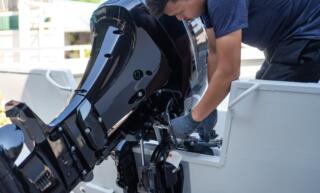
The Different Types of Boat Motors To Consider
When it comes to choosing the right boat motor, it’s essential to understand the various types and their specific advantages. Whether you’re an avid fisher, a weekend adventurer, or a competitive boater, selecting the appropriate motor will improve your boating experience.
Each type of motor offers unique features catering to different needs and preferences. Let’s look at the different types of boat motors to consider and their characteristics.
Outboard Motors
Outboard motors are the most common and versatile type of boat motor. They consist of a self-contained unit mounted on the transom, providing propulsion and steering functions. Outboards are available in two-stroke and four-stroke engines, both offering benefits.
Two-Stroke Outboard Motors
Two-stroke outboard motors are compact, lightweight, and relatively less expensive than four-stroke engines. They operate on a simple cycle with fewer moving parts, making them easier to maintain. However, they tend to be louder and emit more pollution than four-stroke models.
Four-Stroke Outboard Motors
Four-stroke outboards provide better fuel efficiency and smoother operation than two-stroke designs. They also emit fewer pollutants and are generally quieter, making them a more environmentally friendly option. However, they are typically more expensive to purchase and maintain.
Inboard Motors
Inboard motors are mounted within the hull of the boat, providing propulsion by turning a propeller or jet. These motors offer several advantages, such as better balance and stability due to their centralized location on the boat.
Direct Drive Inboard Motors
Direct drive inboards have the engine connected directly to the propeller shaft, providing maximum power and control. They are ideal for watersports or other activities that require precise steering and quick acceleration.
V-Drive Inboard Motors
V-drive inboards have the engine placed toward the back of the boat, with a driveshaft and transmission running forward to turn the propeller. This configuration provides more interior space in the boat and a smoother ride due to weight distribution.
Jet Drives
Jet drives use a pumping unit instead of a propeller to create thrust. They are popular in smaller boats, such as personal watercraft or shallow-water fishing boats. Jet drives offer better maneuverability and safety since there is no exposed propeller.
Sterndrive Motors
Sterndrive motors combine features from both outboard and inboard motors, with an engine mounted inside the boat connected to a drive unit on the outside. This design allows for more interior space and better handling, making it popular for recreational boaters.
Electric Motors
Electric motors can be either inboard or outboard and are becoming increasingly popular due to their quiet operation, low maintenance, and environmental benefits. In fact, electric outboard motors might be the future because of their sustainability and performance. They are often secondary motors or for smaller boats.
As you can see, there are many different types of boat motors to consider when choosing the right one for your needs. Consider your boating activities, budget, and environmental impact when selecting the perfect boat motor for your vessel.






